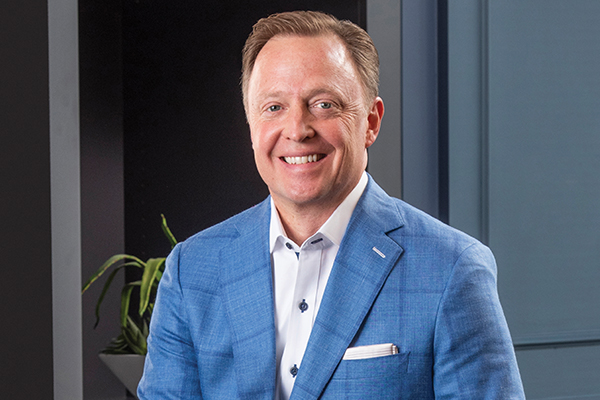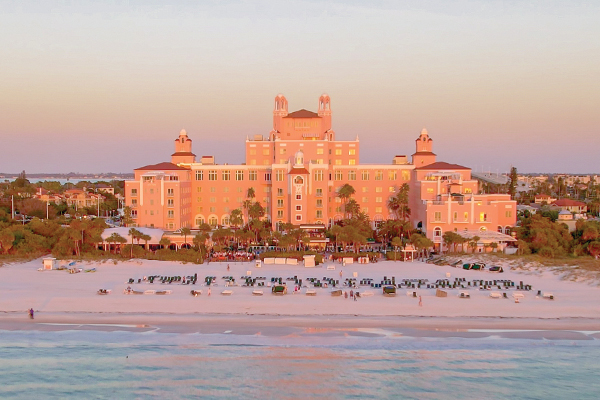It’s a blustery March day in Atlanta. “Hotlanta” is anything but. With an aeolian shove, I arrive at Ravinia Drive, which, among the tempestuous gusts, is a zen-like escape: a campus of tall office buildings hidden behind lush greenery with a pond at its center. One can imagine workers enjoying its serenity, but not on this day amid its rippled murk.
Perched above the water is One Ravinia Drive, home to Davidson Hospitality Group, a multi-vertical hotel management company that is now in its 50th year of operation, and if you visit the office, beyond its hotel-like decor and trappings, there is an authenticity of the people who work there: they really enjoy each other’s company. A WFH impulse there is not.
It starts at the top. Thom Geshay is CEO and president of Davidson and has been with the company since 1988, back when it was developing and managing its own hotels, not just running them. A lot has changed in the interim since, but, then again, some things stay the same.
Geshay occupies a corner office looking outward on the Perimeter. It takes some time to get there, stopping along the way to exchange pleasantries with colleagues. In his office, an envelope sits atop his keyboard. He opens it and movingly explains that it was a thank-you note from an employee, who was having a stressful day. Geshay noticed it and offered her a comforting word. It didn’t go unnoticed.
The exchange is an instruction. The epitome of what a management company should strive to be: care for guests, service owners. It’s a microcosm of why Davidson has ranked number one on the J.D. Power North America Third-Party Management Guest Satisfaction Benchmark for two consecutive years.

The idea of transitioning into a pure management company came at the behest of owners: When Davidson sold a hotel,
the buyer would want to keep it on as the manager. “We woke up one day and it was like 50/50—the number of hotels that we owned and operated and that were third- party managed,” Geshay said. It didn’t take too long for it to flip on its head the other way. “Other people started reaching out and asking if we’d manage their hotel for them.”
Today, Davidson Hospitality has a portfolio of 85 hotels and resorts, up and down the chain scales. And it sorts them among three separate verticals: resorts, lifestyle, hotels. All of them are third-party managed. Davidson also has a restaurant group and has its own in-house creative agency.
In the time that Davidson has taken to reimagine its business, a crop of management companies has bloomed beside it—hundreds—some with small portfolios, others larger, all eager and earnest in their abilities to generate returns for owners. Some do it very well; others not as much. But they are all looking to eat away at the same pie, jockeying for position and hoping to catch the eye of an owner.
It’s the types of assets being managed that has changed, as Geshay mentions, the result of the fractionalization of the broader hotel industry, transmuting into a Balkanized and specialized ecosystem, where being great at one thing is rewarded more than being good at some things.
Davidson has been true to its mission of operating hotels—branded and independent—that are mainly full-service, upper-upscale and above. At this, Geshay offers a short history lesson on a phenomenon that has reshaped the hotel industry over the last half a century. Decades ago, most hotels were owned by individuals, then larger corporations or life insurance companies stepped into the breach. Hotels were—still are—a risky investment, but the materialization of better and more informed data made investing and operating hotels a less-dicey proposition.
“Hotels became more of an investable asset class,” Geshay said. Today’s cadre of investors include private equity, public REITs, high-net-worth individuals, family offices and sovereign wealth. “Everyone is in the hotel space,” Geshay said.

Which makes handing over the operations of an asset that much more important. There’s a simple reason F1 cars are entrusted to the likes of Schumacher, Hamilton and Verstappen: they know what they are doing. It’s the same with management companies: you need smart, experienced outfits running a business as multifaceted as hotels. It’s because of this that Geshay says third-party management has become so complicated because the hotels have become more intricate. It’s also why Davidson has been able to rise to the top among the best—selected by blue-chip companies to operate their hotels.
It’s also Davidson’s point of differentiation. The company made the purposeful decision to stick to operating higher-segmented hotels and resorts, eschewing some of the midscale and select-service stock that other managers take on. It operates for such monied titans as Starwood Capital and Blackstone, who make gigantic $100-million-plus investments.
Some of Davidson’s peers have larger portfolios, exceeding 100 hotels, but Davidson consistently is one of the highest revenue-producing management outfits in the business, a function of the types of assets it operates.
According to Geshay, Davidson averages around $30 million of revenue per property per year, equating to around $2.5 billion per year in total revenue. Instead of managing, for instance, five Hampton Inns, it can hit its revenue mark by managing one Margaritaville resort (it operates six Margaritavilles altogether). “It just takes less hotels to get there,” he said.
Davidson has considered getting into the midscale space but has so far shown reluctancy to do so. Geshay knows the profit margins are higher and the relative ease in running them. He knows that Davidson could be over 150 hotels if it dipped its toes into select service. And it’s something he has grappled with and considered. Ultimately, it’s not part of the Davidson ethos. “I’ve always felt like that would detract from how we really separate ourselves,” Geshay said. “What we’re really good at are complicated, sophisticated, larger, high-revenue assets. We let the other 400 management companies people fight over the other stuff.”

MAKING THE MOVES
Geshay was literally pushed into hospitality. Upon graduating high school in Wisconsin, his family moved to Asheville, N.C., where his father told him he needed to get a job to help pay for college. Like out of a movie, upon arriving in the Blue Ridge Mountain city, one of the first things they came across was a Holiday Inn with a “Help Wanted” sign in the window. Geshay’s father literally dropped him off there. In a dose of foreshadowing, the hotel was owned and managed by Davidson. When Geshay wasn’t working at the hotel, he was busy pursuing an engineering degree at North Carolina State, about 250 miles due east.
Back in the eighties, Holiday Inns and their contemporaries weren’t just a place to get a good night’s sleep; many of them were nighttime attractions, boasting some of the best nightclubs towns had to offer. A man of many talents, Geshay was also an avid deejay, spinning Janet Jackson and Prince records for revelers packing the dance floor. But Geshay didn’t have just an ear for music, he had an eye for making money. When the music is too good, no one leaves the dance floor. When no one leaves the dance floor, drink sales drop. The analytical Geshay—he was an industrial engineer by trade, after all—devised a method of varying the music, combining fast-paced hits with ballads, the idea being to push people toward the bar at intervals.
The industrious Geshay caught the eye of his mentor and boss who made him an offer. It was a proposal that would change the course of Geshay’s career. At the time, he was working for IBM and making a generous salary, but IBM and Holiday Inn are about as opposite as it gets. He was lured back as the bar manager, telling his father he was the beverage director.
It was his passion for hospitality that brought him back and propelled him to where he is today: leading one of the preeminent management companies in the business.

GROWING UP
Davidson was still a small business back then. It was started by a couple of brokers out of Memphis who sold the rights to Holiday Inns in Orange County, Fla. They managed to take on one hotel in Augusta, Ga., and grew a portfolio from there. In 1991, the business was acquired by Wilton Davidson “Chick” Hill, where the Davidson name came from, before Hill sold it in 2006 to a syndicate that included Geshay and past Davidson CEO John Belden. In 2015, KSL Capital Partners became the majority owner of Davidson, able to provide the company with the growth capital it needed. Nine years later, they are still on board, a peculiarity in the private equity space, which typically has shorter hold periods.
Davidson manages 15 hotels for KSL today. It underwrites hundreds of hotels each year but only a handful of those might work for KSL. “We’ve tried to be very thoughtful about picking owners with different investment criteria, so that we’re not always having to compete for deals,” Geshay said.
Despite Davidson’s southern roots, its hotels are spread across the U.S. Its biggest concentrations are in Florida (22 hotels) and California (13 hotels), part of that because of its strong resort business, having formed a dedicated resorts vertical in 2021, led by EVP Steve Contos. “It became apparent that we should have an operational approach for this unique asset type,” Geshay said at the time of the launch.
It followed a similar move for the company when it introduced a devoted category to lifestyle hotels called Pivot, which it launched in 2016 and is led by EVP Rick Colangelo. Hotels within this subset of Davidson include 21c Museum Hotel Chicago, Canopy by Hilton Philadelphia City Center and Hotel Zephyr Fisherman’s Wharf in San Francisco, the inaugural Pivot property.
Davidson might even have another vertical up its sleeve. At one point, Geshay talked through a SWOT analysis of the company. One of its opportunities, he said, resides in the luxury space, where Davidson already has a handful of hotels. “Some of the longer-term master contracts that have been in place will roll off at some point,” he said, should an owner want a third-party manager instead of a brand. “I want to be prepared and in position. The likely outcome is going to be that we’ll have a luxury vertical.”

The third-party management space is not immune to disruption. Up to now, Davidson has grown organically, on its own, while others in the space tack on companies in a game of third-party operator consolidation. The sheer volume of management companies today is striking; some attrition is necessary, if not warranted.
“It’s good and bad,” Geshay explained. On one hand, a company can grow very quickly by ostensibly buying management contracts; on the other hand, absorbing another company comes with pain points, such as ensuring continuity and integrating cultures. “We will never say never because it’s my job to run a company,” he said. But don’t hold your breath. “We are firm believers in our culture of character and integrity. We’ve been very successful for 50 years now. That’s hard. When you merge two cultures, there’s also a downside that comes with that. You do see some companies get sidetracked.”
Geshay is not one for distraction. Building a hotel company with an enterprise value north of $2 billion makes sure you are tuned in. Geshay is a self- described “late-night guy,” but he works smartly: Atlanta traffic is notoriously punishing, so Geshay likes to work from home before driving into the office after rush hour. He’s then in the office well past normal quitting time.
Our time up, I walk with Geshay toward the exit of Davidson’s office, which, not so different from some hotels, has a ping-pong table adjacent to a shelf of spirits. We halt and are greeted by two Davidson employees that have been with the company for more than a decade. They are both folksy but serious about the pride they share working for Davidson.
Near the elevators, Geshay is approached by a woman. They exchange pleasantries as Geshay offers a reassuring pat on her shoulder that ends in a hug. The woman expels a sigh of relief. It turns out, she had been the one with the difficult day and had placed the note on Geshay’s keyboard. Earlier in the day, Geshay said something that crystallized in that moment. “We all work so hard,” he said, “because we don’t want to let each other down.”
